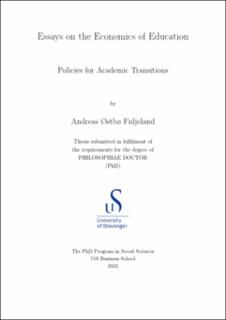| dc.description.abstract | This doctoral thesis builds on a rich literature investigating how education policy affects students’ learning, motivation, investment, and decisionmaking— all of which are determinants of the productivity of education systems. Over the past decades, the education field has yielded one of the most prolific strands of literature within applied economics research (Machin, 2014). In part this reflects a growing demand for an evidencebased design of education policy. Rigorous and thoughtful economic research can often produce such evidence, which may guide policymakers in the policy-design process (Hanushek et al., 2016).
Policy questions are ubiquitous in the education domain. In particular, many dimensions of a child’s environment in school are determined by policymakers, ranging from the small and specific (such as the number of students in each class or the books used) to the large and general (such as the length of compulsory education, financing, and tracking). Another prevalent structural feature of the schooling process determined by policymakers are the transitions from one educational stage to the next. These milestone moments not only involve the replacement of one set of education policies by another, but have evolved into rites of passage in children’s lives, signifying the end of one stage of development and the beginning of the next (Bharara, 2020; Evans et al., 2018).
Like more traditional rites of passage, these academic transitions are often costly. Because of the institutional discontinuities they represent, they are disruptive and challenging for many students (Anderson et al., 2000; Curson et al., 2019; Rice et al., 2015; Rice, 2001; Symonds and Galton, 2014), forcing them to navigate a new educational context that often involves a new school, new peers, and new teachers. Further, at each new stage, students not only face new and challenging academic demands but also heightened expectations of their independence and ability to assume responsibility for their own schooling. Not surprisingly, these transitions represent a period of particular vulnerability for many young people. An extensive research literature has consistently found associations with negative outcomes such as a decline in academic engagement and motivation, a decline in grades, and an increased risk of dropout (see, e.g., Bharara, 2020; Eccles et al., 1993; Evans et al., 2018; Galton et al., 1999 or Mizelle and Irvin, 2000).1 Because the number, timing, and structure of transitions are all the result of policy, and imposed on students by policymakers, there is a need for a solid base of evidence—particularly causal—on how students navigate and prepare for them that can inform policy design so as to minimize the negative outcomes associated with those transitions (Rice, 2001; van Rens et al., 2018).
My aim for the thesis is to contribute to that evidence base. Empirical studies, such as those in the following chapters, can provide insights for policy on how best to prepare students for transitions, and how best to support them in making well-informed choices. For example, ensuring that students are adequately prepared for subsequent stages of schooling is an important step in making the education system more efficient and productive. Understanding how children and adolescents make investments and choices in their schooling can help policymakers identify areas where interventions might reduce inequalities in (opportunities for) human capital accumulation. Indeed, support and preparedness have been identified in the education literature as key elements for effective transitions (Anderson et al., 2000; Bharara, 2020). | en_US |
